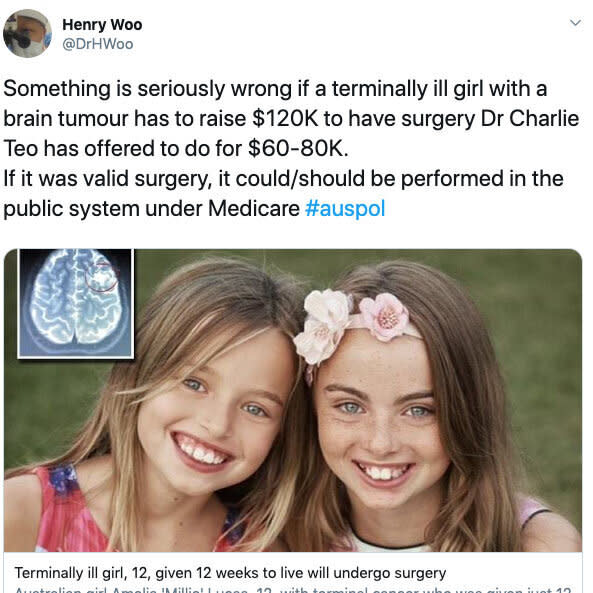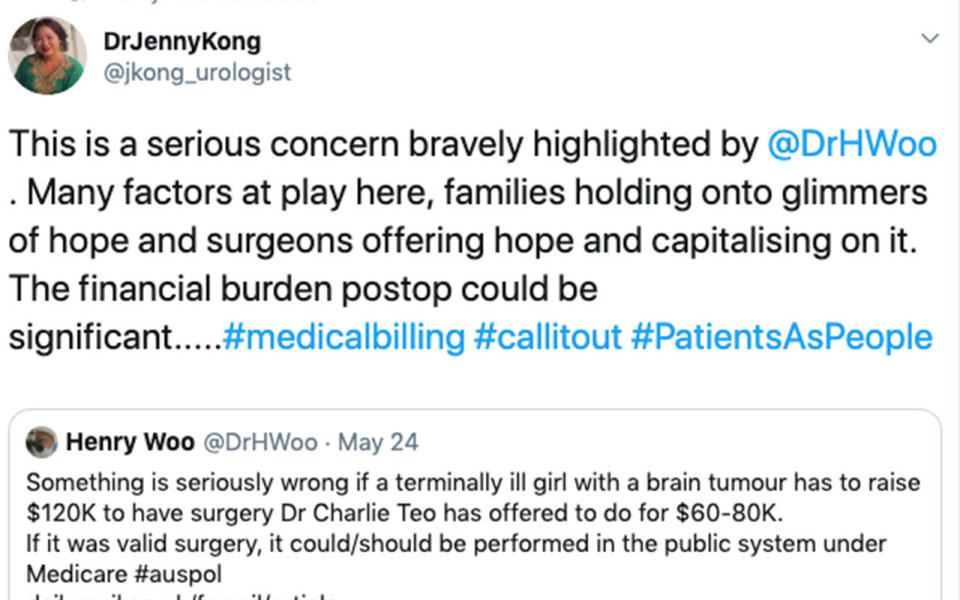Surgeon and TV host clash over costly brain operations
Today Show host Georgie Gardner and acclaimed Australian brain surgeon Dr Charlie Teo have clashed in a tense interview over the high cost of the doctor’s medical expertise often raised through crowd-funding.
The interview, which aired Wednesday morning, came after intense criticism Dr Teo has faced by medical peers for charging patients six-figure sums for life-saving surgery.
In a number of recent instances, the money for the patient’s surgery had been raised through online crowd-funding campaigns.
Gardner had put some of these concerns to Dr Teo, namely those made by Dr Henry Woo, a professor of surgery at the University of Sydney, who had taken to Twitter to ask why there were currently “more than 100 crowd-funding sites” trying to raise money to pay for his services.
Dr Charlie Teo defends the high cost of his procedures, instead putting the onus on other neurosurgeons who won't swallow their egos and says "I would do it free of charge" if Australia's healthcare system covered the costs. #9Today pic.twitter.com/mwjmuMU8Se
— The Today Show (@TheTodayShow) May 28, 2019
“Something is seriously wrong if a terminally ill girl with a brain tumour has to raise $120K to have surgery Dr Charlie Teo has offered to do for $60-80K,” Dr Woo had said on Twitter, a criticism which was quoted back to Dr Teo by Gardner.
“You would be aware some patients have to rely on charity to afford your expertise,” Gardner said, and the exchange turned tense when she added: “I am wondering how that sits with you ethically.”
Dr Teo replied by defending crowd-funding as a means to pay for private health care, saying the actual concept of raising money to try and afford a doctor not covered by Medicare was ethical. It only became unethical if the campaign wasn’t dishonest about their condition or expenses.
Gardner reiterated a criticism made by Dr Woo, asking Dr Teo why – if his services were valid – they couldn’t be covered by Medicare and the public hospital system.

“Let's get our facts straight first,” he replied. “The fact is, although some patients do have to pay over $100,000, that doesn't all go to the surgeon or even the team.
“It is in a private hospital, which is accounting to their shareholders. They have to make a profit.
“So, for example, that $120,000 bill Henry Woo is talking about, $80,000 [goes] to the private hospital. $40,000 [is] dispersed amongst not only the surgeon, the assistant, anaesthetist, pathologist, radiologist [and] radiographer.
“It is not that great an amount to each individual person. When you get your facts straight.”

Gardner pressed on and asked Dr Teo what “percentage of the pie” he would get in that instance, to which he replied, “I got $8,000”, before adding that “it is not really the total amount that each person gets”.
“The fact [is] that people do have to pay for their private healthcare,” he said.
“It is a little bit unfair. If I was a child with cancer and in a foreign state who wants the very best care, I think you should be able to be done in the public system.
“But unfortunately if you are done in the public system a few people have swallowed their egos.”
On a search on GoFundMe for “Charlie Teo” there are 113 campaigns listed, that mention him as the surgeon for which donations are sought to pay for his services.
I find this really disturbing. pic.twitter.com/j4ZQRNHXvQ— Henry Woo (@DrHWoo) May 24, 2019
It was this same egotism, Dr Teo argued, that was behind the recent Twitter storm sparked by Dr Woo and other medical professionals who questioned patients needing to fundraise to pay for Dr Teo’s service.
“The whole Twitter thing is all about trying to destroy or discredit my reputation,” he said.
“I would say to that person, ‘Listen, there is a lot better things to do we should be doing as doctors rather than trolling through websites looking for ways to discredit a colleague’.
“Get back to your lab, try and find a cure for prostate cancer. I will try and find a cure for brain cancer, thank you.”
Surgeon praised a ‘miracle worker’
One former patient of Dr Teo’s has come to his defence since the online eruption of criticism, calling the leading neurosurgeon a “miracle worker”.
Brisbane woman Alyson Dunlop, 36, told the ABC she had seen three different Queensland neurosurgeons who had dismissed a pineal cyst in the centre of her brain as the cause for her extreme vertigo and nausea, headaches, chest pain, partial paralysis, as well as depression and anxiety.
"For the first time after seeing (Dr) Teo I had hope — for the two years before I wasn't given any hope, there was no future," Ms Dunlop told the ABC, claiming she had been bedridden before he operated on her.
Like many of Dr Teo’s patients, she had to fundraise a large portion of the bill for his services but believed the $100,000 bill was a small price to pay to get her “life back”.
"There was no quality of life for me... I believe (we paid) $35,000 to (Dr) Teo and his team, and the rest of those fees were anaesthetist and hospital fees," she said.
Patients shouldn’t have to fundraise for treatment: AMA
The Twitter debate among medical professionals regarding Dr Teo and the more than 100 crowdfunding pages set up to raise money for his expertise prompted the Australian Medical Association and Royal Australasian College of Surgeons (RACS) to say it didn’t support patients having to fundraise for treatment.
RACS executive director of surgical affairs John Quinn yesterday told the ABC that the procedures offered by Dr Teo were already available in the public system — adding that cancer patients should not have to fundraise, mortgage their houses or access their superannuation to pay for surgery.
"If urgent treatment is required, all of these treatments are available in a public hospital at no cost,” he said.
“Those who think if they pay a greater fee that they will get a better service are misguided and misled.”
Do you have a story tip? Email: newsroomau@yahoonews.com.
You can also follow us on Facebook, download the Yahoo News app from iTunes or Google Play and stay up to date with the latest news with Yahoo’s daily newsletter. Sign up here.


